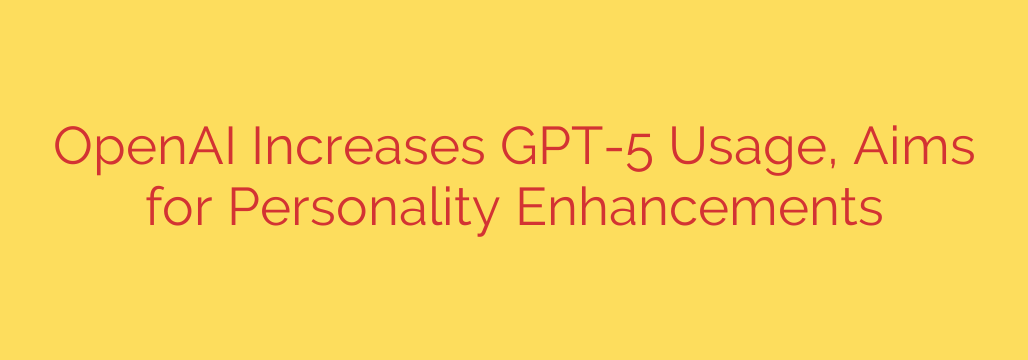
GPT-5 on the Horizon: OpenAI Ramps Up Testing for a More Capable and Personalized AI
The world of artificial intelligence is bracing for its next major leap forward. While GPT-4 continues to power countless applications, attention is rapidly shifting to its successor. Recent developments indicate that OpenAI is not only making significant progress on its next-generation model, widely anticipated to be GPT-5, but is also intensifying its safety and capability testing.
This next evolution in AI isn’t just about raw processing power; it’s about creating a more nuanced, personalized, and ultimately more useful tool.
A New Phase of Intensive Evaluation
Before any new, powerful AI model can be released to the public, it must undergo rigorous internal evaluation. This crucial phase, often called “red teaming,” involves systematically stress-testing the model to identify flaws, potential misuse, and unforeseen risks.
OpenAI is significantly increasing its internal testing and red teaming efforts for its next-generation model. This involves granting early access to a select group of trusted enterprise users and internal teams. The goal is to discover and patch vulnerabilities related to safety, bias, and security long before the model is widely available. This proactive approach is essential for building a foundation of trust and ensuring the technology is deployed responsibly. By simulating adversarial attacks and exploring edge cases, developers can better understand the model’s limitations and build more robust safeguards.
Beyond a Tool: The Push for AI “Personality”
One of the most exciting frontiers in AI development is the move beyond generic, one-size-fits-all responses. The next wave of AI aims to be more adaptable and consistent, capable of adopting specific personas or personalities as directed by the user.
A key focus for the upcoming model is the enhancement of “personality” and personalization features. This isn’t about creating a conscious or sentient being. Instead, it’s about enabling the AI to maintain a consistent style, remember user preferences across conversations, and interact in a more natural, tailored way. Imagine an AI that can consistently adopt the tone of a professional business consultant, a patient academic tutor, or a witty creative partner, depending on your needs.
This could transform the AI from a general-purpose tool into a specialized assistant for different roles, leading to massive gains in productivity and user experience. For businesses, it means an AI that can learn and adhere to brand voice guidelines. For individuals, it promises a more intuitive and effective digital collaborator.
With Great Power Comes Greater Responsibility
The prospect of a more capable and personalized AI is thrilling, but it also raises important questions about safety and ethics. An AI with a convincing “personality” could be used for more sophisticated forms of manipulation or deception if not properly aligned with human values.
With greater capabilities and personalization comes an even greater responsibility for safety and ethical alignment. This is precisely why the intensified red teaming is so critical. The challenges include preventing the model from generating harmful content, ensuring it doesn’t perpetuate biases, and making it resilient to malicious actors seeking to exploit its advanced features. The development of GPT-5 is as much a test of safety engineering as it is of AI capability.
Security and Best Practices in the Age of Advanced AI
As AI models become more integrated into our personal and professional lives, it’s essential to adopt smart security habits. Here are a few actionable tips:
- Verify Critical Information: Never trust an AI’s output blindly, especially for important facts, figures, or advice. Always cross-reference information with reliable primary sources.
- Protect Your Data: Be mindful of the personal or proprietary information you share in prompts. Treat conversations with AI as you would any other digital communication and avoid sharing sensitive data unless you are certain of the platform’s privacy policies.
- Recognize the Limits: Understand that even the most advanced AI is a tool, not an oracle. It doesn’t possess true understanding or consciousness and can make mistakes or “hallucinate” information.
The development of what we expect to be GPT-5 represents a pivotal moment in the evolution of artificial intelligence. It signals a shift from purely functional intelligence to a more personalized, responsive, and integrated form of AI. As we stand on the cusp of this new era, the emphasis on rigorous testing and responsible development will be the defining factor in its success.
Source: https://www.bleepingcomputer.com/news/artificial-intelligence/openai-relaxes-gpt-5-rate-limit-promises-to-improve-the-personality/








